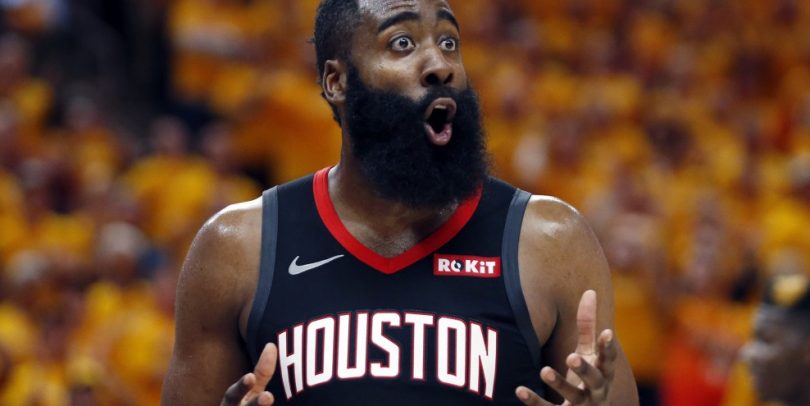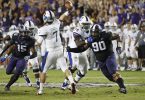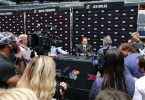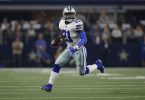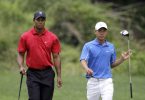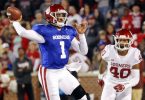The first round of the NBA playoffs offered some notable moments – the Clippers winning two games on Golden State’s home court; Brooklyn challenging the Sixers by winning the opening game at Philadelphia; San Antonio without Duncan, Ginobili or Parker taking Denver to seven games before losing.
But it ended quietly with the top four teams in each conference advancing.
Also ending quietly was a streak of unprecedented brilliance. It wasn’t a shock because the Los Angeles Lakers struggled throughout the season. Two months before the season ended, it was apparent the Lakers would not play in the postseason. And then a 1-10 stretch in the first three weeks of March made it official.
It has been 13 years since LeBron James did not play in a first-round series and, in fact, he won all 13 of them – something even Michael Jordan did not do. Jordan’s teams lost three times in the first round.
There is little doubt that James has helped lift NBA TV ratings, and it will be interesting to see what impact his absence might have. The first returns suggest he is missed. The ratings for the first round were down 18 percent from last year.
But the Finals will be the true indicator of whether he is missed, because there hasn’t been an NBA Finals without LeBron James since 2010.
He has made eight consecutive Finals in a way no one has before and, very likely, no one will again. James is one of only five men who have played in at least eight consecutive NBA Finals. One was Bill Russell, who played in 10. Three others – Sam Jones (9), Tom Heinsohn (9) and Frank Ramsey (8) – were Bill Russell’s teammates.
The fifth is James but he did something none of others had done. He went to eight straight Finals with two different teams – four with the Cavaliers and four with the Heat. That, arguably, is even more difficult than what the Celtics did, although Celtic faithful will point out the Celtics won all eight while James won only three.
Winning a title in the current era, however, is much more difficult than in was in the ‘50s and ‘60s. That’s not to take away from what the Celtics accomplished. Eleven titles in 13 years – including the stretch of eight straight – is insane. But a case can be made that what James has done rivals Boston because there is a big difference between now and then.
When Boston’s streak of eight consecutive titles began in 1959, there were eight teams in the league. To win a title, the Celtics had to win only two series. Eight playoff victories made them champions. Today, teams have to win four series and 16 games.
Russell led the Celtics to 13 playoff appearances. In his career, he played in 165 playoff games.
During his 15-year career, James has played in 239 playoff games. In the eight-year stretch that preceded this season, he played in 168 playoff games – three more than Russell played in his career.
These points are not made to suggest that teams led by James were superior to Russell’s Celtics because 11 championships quickly settles any argument.
The impact James has had on his teams before this season is profound. James has changed teams three times, going from Cleveland to Miami in 2010, back to Cleveland in 2014 and to the Lakers in 2018. Look what happened. But it again makes a point that has been made before and that is James – who has won the Most Valuable Player award four times, but none in the last six years, has been taken for granted. The impact he has had on his teams before this season is profound. James has changed teams three times, going from Cleveland to Miami in 2010, back to Cleveland in 2014 and to the Lakers in 2018. Look what happened.
Cleveland:
2009-10 with LeBron: 61-21
2010-11 LeBron leaves: 19-63
Miami:
2013-14 with LeBron: 54-28
2014-15 LeBron leaves: 37-45
Cleveland:
2017-18 with LeBron: 50-32
2018-19 LeBron leaves: 19-63
LeBron led the Cavaliers to the NBA Finals five times and won one. He led the Heat to the Finals four times and won two. His impact has been monumental.
Which is why what happened this season is such a shocker. The Lakers finished with a 35-47 record the year before LeBron arrived but improved only to 37-45 with him. He played in a career-low 55 games, missing time because of a groin injury, then not playing in the last six games of the season because the Lakers were out of the playoffs.
Since he did not have the same impact on the Lakers that he’d had on previous teams, critics are quick to muse that his dominant days are over. Yet the stats say that at age 34, James has not suddenly lost his ability to impact a franchise.
James did not play enough to qualify for the league leaders, but if he had maintained his numbers in the 27 games he missed, he would have finished fifth in the league in scoring with 27.4 points per game.
His average of 35.2 minutes a game was the lowest in his 16-year career, but only six players averaged more this season.
His 8.4 assists were third highest in the league and were the second most in his career.
And his 8.6 rebounds – a career high – would have placed him 21st in the league.
The numbers suggest the Lakers’ problem isn’t James, which is not news because the Lakers have an under-performing front office. Magic Johnson was running basketball operations, but he quit. And head coach Luke Walton as fired. If success starts at the top, the Lakers are in disarray.
The Lakers were unable to trade for Anthony Davis during the season, but they have room for two free agents from an impressive free agent list that includes Kevin Durant, Kawhi Leonard, Kemba Walker, Kyrie Irving, Klay Thompson, Jimmy Butler and Khris Middleton.
If they are successful at luring at least one but perhaps two top free agents, we’ll see how much James has lost.
His Finals streak is over but, like Wilt Chamberlain’s 100-point game, it a record that seem unbreakable. When the Finals arrive, we’ll enjoy the new faces, but we will marvel at the greatness it takes to get there eight consecutive times.

